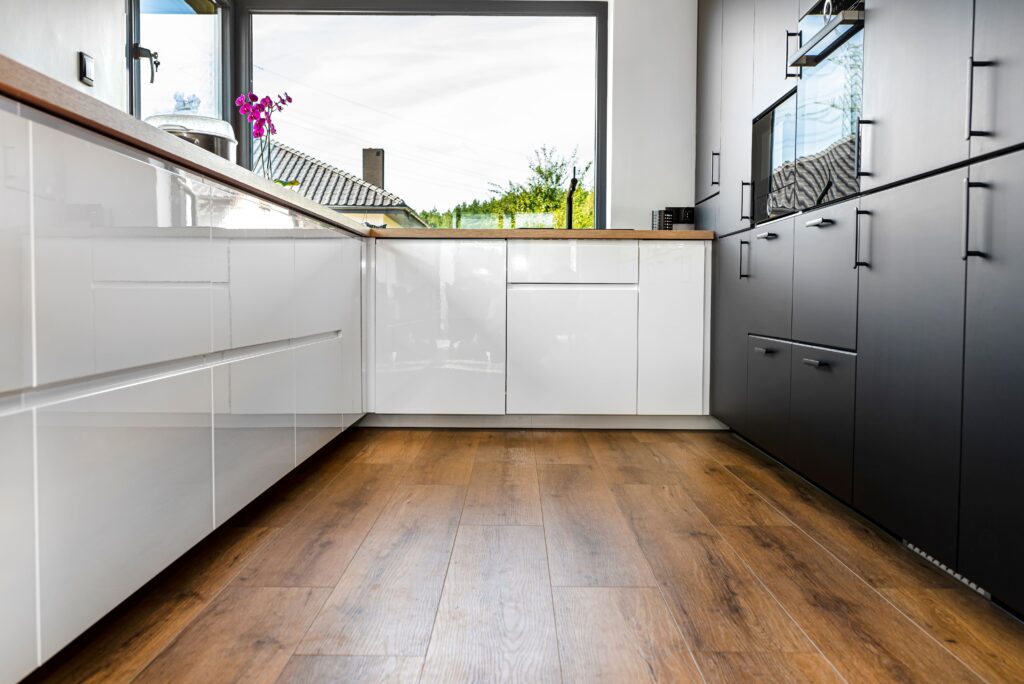Vinyl flooring is a type of resilient flooring made from a synthetic material called polyvinyl chloride (PVC). It is a popular choice for flooring in residential and commercial settings because it is durable, affordable, and easy to install.
Vinyl flooring comes in many different styles and designs, including planks, tiles, and sheets. It can mimic the appearance of other flooring types, such as hardwood, stone, or ceramic tile, while providing additional benefits such as being water-resistant, stain-resistant, and easy to clean.
Frequently Asked Questions Vinyl Flooring
1. How much is vinyl flooring in Singapore?
Comparatively cost to install vinyl flooring is from $5.50 to $6.50 per square foot.
2. Is Vinyl flooring better than laminate flooring?
Vinyl flooring has a longer lifespan than laminate flooring, but vinyl flooring is a bit costlier when compared to laminate flooring.
3. What are the pros and cons of vinyl flooring?
Pros of Vinyl flooring
Vinyl flooring is 100% moisture resistant
Vinyl floors can be installed over floors like concrete, tiles, etc.
A wide variety of decor options are available
Easy to clean and less maintenance required.
Cons of Vinyl flooring
Difficult to remove
Sharp objects can damage the Vinyl floors
It is Non-biodegradable.
It can fade or discolour when exposed to UV rays.
4. What is the lifespan of Vinyl flooring?
The average lifespan of vinyl flooring is 10 to 20 years if installed but maintained correctly.
5. Is Vinyl flooring so expensive?
No, Vinyl flooring is one of the most affordable flooring materials.
6. Is Vinyl flooring waterproof?
Yes, basically vinyl flooring is waterproof to resist water intrusion. You can install this floor in the kitchen or bathroom.
7. Is Vinyl flooring warmer than tiles?
Yes, Vinyl flooring is warmer than tile flooring.
8. Is Vinyl flooring slippery when wet?
Yes, Vinyl flooring is slippery when it is wet.
9. Are vinyl floors suitable for kitchens?
Yes, Luxury vinyl flooring and also Vinyl rolls are suitable for your kitchen.
10. Is vinyl flooring suitable for health?
Vinyl flooring is safe, but it may affect your health when installed with certain chemicals.
11. Do vinyl floors scratch easily?
No, it doesn’t scratch easily. Spills won’t particularly damage the floors, and you can clean them easily.
12. What happens if vinyl flooring gets flooded?
Nothing will happen as vinyl floors are water resistant. So you can wipe off the water and bring it back to its original condition.
13. How do you protect your vinyl floor?
Install felt pad protectors at the base and feet of your furniture so that it won’t scratch your vinyl floor and make it durable.

14. How to fix vinyl floor scratches?
Apply wax on the floor and remove the excess if needed. After waxing, use a clean cloth and gently rub over the area.
15. Can Vinyl flooring cause allergic reactions?
No, In fact it’s allergy-friendly as you can easily clean the dust and debris.
16. Is Vinyl flooring suitable for HDBs?
Yes, it’s very affordable and has a lifespan of 10 to 15 years if installed and maintained correctly.
17. Does vinyl flooring look like wooden flooring?
Yes, it looks and feels like natural wood. Also, it is thicker and more rigid, making it even more durable.
18. How Long Does Vinyl Floors Off Gas?
In effect, vinyl floors emit excessive gas for 3 to 5 weeks after the installation.
19. Do vinyl floors have an odor?
Yes, it will release chemicals but create a pungent smell in the environment.
21. Is Vinyl flooring easily damaged?
Vinyl floors are more durable, but they are prone to damage easily.
22. Can water seep through vinyl planks?
Even Though vinyl floors are waterproof, they can seep through the water during natural calamities like floods.
23. Can mold grow under vinyl plank flooring?
Although vinyl floors are water resistant, if water seeps through cracks, it can allow mold to grow underneath the floors.

24. Why is my Vinyl floor sweating?
Vinyl floors release sweat as the low vapour permeability of the LVF material, and building material allows humidity so that removes water vapours as sweat.
25. How to kill mold on vinyl floors?
Clean the mold-affected surface with bleach and water to kill the molds, let it dry thoroughly, and always keep that affected area dry.
26. Can I reuse Vinyl flooring again?
Yes, both vinyl plank and luxury vinyl floors can be reused again. So you have to remove it from the floor and reinstall it correctly.
27. What is the average thickness of vinyl flooring?
The average thickness of vinyl flooring is 3 mm to 8 mm+
28. What are the different types of vinyl flooring?
There are three types of vinyl flooring available in the market.
- Luxury Vinyl Tile (LVT)
- Luxury Vinyl Plank (LVP)
- Sheet Vinyl
29. How much does it cost to remove vinyl flooring?
It will cost certainly $1000 to remove the installed vinyl flooring.
30. Can I put heavy furniture on vinyl plank floors?
Yes, you can use heavy furniture on vinyl floors as it has good durability.
31. What are the problems with Vinyl plank flooring?
Stains, scratches, discoloration, cracking, peeling, and other installation-related failures are the most straightaway problems with vinyl flooring.
32. Why is my vinyl floor peeling automatically?
Vinyl floors can peel themselves because adhesives are gone if you install vinyl floors long back and it is not taken care of properly.
33. Do vinyl floors fade away quickly?
Yes, After all vinyl floors are not UV resistant, it can affect the vinyl and make it discolored.
34. What is the difference between vinyl and luxury vinyl?
Luxury Vinyl Plank (LVP) or Luxury Vinyl Tile (LVT) is much thicker than the traditional vinyl sheets. It is the difference between vinyl and luxury vinyl.
35. Is Luxury Vinyl Plank slippery?
After all vinyl floors are slippery by nature. So it’s best to apply an anti-skid coating over the vinyl floors.
36. Are vinyl floors noisy?
Vinyl floors look like wooden floors, but it’s not noisy. Vinyl floors absorb sounds for a noise-free environment.
37. What should you not put on a vinyl floor?
Neither use detergents, abrasive cleaners, mop, nor other cleaning solutions over vinyl floors, as they can damage and dull your vinyl floors.
38. What is the most durable indoor flooring?
The vinyl plank (Luxury Vinyl) floor is the most durable indoor flooring than any other flooring type.
39. Is vinyl and vinyl plank the same?
Traditional vinyl comes in a rolled format that can cover the overall space at one shot and it is similar to linoleum flooring. In contrast, Vinyl planks are installed as individual planks to create a natural wood-like flooring finish at affordable prices. So vinyl and vinyl planks are not the same.
40. Do I need an underlay for vinyl flooring?
No, not. Vinyl flooring doesn’t need an underlay, and vinyl floors have their base layer, so adding another extra layer is unnecessary.

41. What is the most popular vinyl flooring color?
Overall Grey vinyl flooring is the most popular vinyl flooring color.
42. Can I install new vinyl on top of old vinyl?
Remove the old vinyl before installing the new vinyl. But in a few cases, you can install the new vinyl over the old one once, but if you can’t, add two or three times. So removing the old vinyl is most recommended.
43. Can I paint vinyl floors?
Yes, certainly you can paint your vinyl floors. But hire a professional painter to paint the vinyl floors for long-lasting durability.
44. How long does a painted vinyl floor last?
The painted vinyl floor can last up to 6 to 12 months. Use quality paints to increase the durability of the painting.
45. Why is vinyl flooring turning yellow?
Both rubber and vinyl combine and produce a chemical reaction that makes your vinyl floors yellow.
46. Which is cheaper, linoleum or vinyl?
Vinyl floors are cheaper than linoleum therefore Vinyl floors are easy to install and clean as well as affordable.
47. What type of mop is best suited for vinyl floors?
However microfiber mop is best suited for vinyl flooring.
48. What are factors to consider when buying vinyl flooring?
Choose the brand which has high customer satisfaction and reputation. Also, check for scuff, stain, and scratch resistance when buying new vinyl floors for your residential or commercial properties.
49. What thickness of vinyl plank is best?
4mm to 6mm is the best thickness for vinyl plank floors.
50. How long does vinyl flooring take to install?
It takes 1-2 days to install the vinyl floorings.

